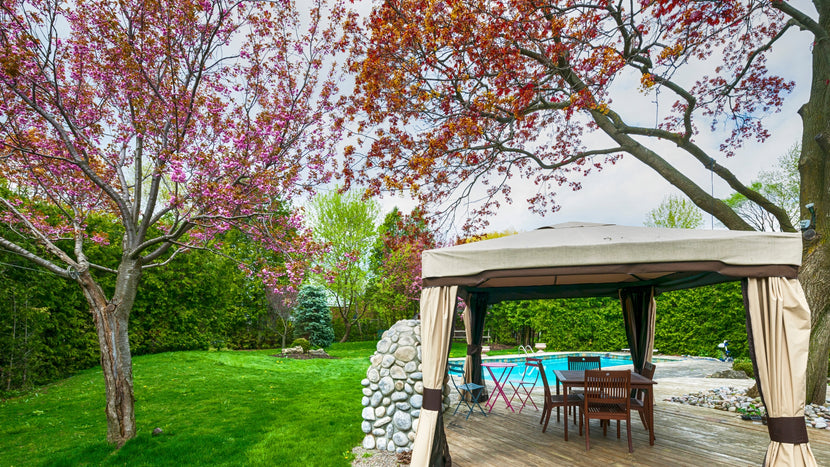
The Incredible Benefits of Shade Trees for Humans and the Environment
Shade trees are invaluable assets to both urban and rural landscapes. They offer a multitude of benefits that enhance our quality of life and contribute to a healthier environment. These majestic trees, with their sprawling canopies and deep roots, provide much more than just a respite from the sun.
Shade trees are crucial in mitigating climate change, improving air quality, conserving water, and supporting wildlife. In this blog, we will explore the various advantages of shade trees and why they are a must-have in any landscape.

Environmental Benefits of Shade Trees
- Climate Change Mitigation: Shade trees are powerful tools in the fight against climate change. Through the process of photosynthesis, they absorb carbon dioxide from the atmosphere and release oxygen, helping to reduce greenhouse gases. A single mature tree can absorb up to 48 pounds of carbon dioxide annually, significantly impacting air quality and global warming.
- Improved Air Quality: Trees act as natural air filters by trapping dust, pollen, and other pollutants. Their leaves and bark can absorb harmful gases such as sulfur dioxide, ammonia, and nitrogen oxides, improving our air. Shade trees, particularly in urban areas, help reduce the urban heat island effect, where concrete and asphalt absorb and re-radiate heat, leading to higher temperatures.
- Water Conservation: Shade trees play a critical role in water conservation. Their extensive root systems help reduce soil erosion by stabilizing the soil and improving water infiltration. This reduces runoff and allows more water to be absorbed into the ground, replenishing aquifers and maintaining the water table. Additionally, the shade these trees provide reduces the evaporation of water from lawns, gardens, and other vegetation, ensuring that more water remains in the soil.
Human Benefits of Shade Trees

-
Health and Well-being: Shade trees profoundly impact our physical and mental
health. Spending time in green spaces and under the canopy of trees has been shown to reduce stress, lower blood pressure, and improve mood. Trees provide shade that protects us from harmful UV rays, reducing the risk of skin cancer and heat-related illnesses. Parks and streets lined with shade trees encourage outdoor activities such as walking, jogging, and cycling, promoting a healthier lifestyle. - Energy Savings: Strategically planting shade trees around homes and buildings can lead to significant energy savings. Trees provide natural cooling by shading rooftops, walls, and windows, reducing the need for air conditioning during hot summer months. According to the U.S. Department of Energy, properly placed shade trees can reduce cooling costs by up to 30%. Deciduous trees lose their leaves in winter, allowing sunlight to warm homes and reducing heating costs.
- Aesthetic and Property Value: Shade trees enhance the beauty of any landscape, adding texture, color, and visual interest. Mature trees create a sense of tranquility and provide a natural habitat for birds and other wildlife, enriching our connection to nature. Moreover, properties with well-maintained trees and landscaping typically have higher market values. Studies have shown that homes with trees can increase property values by 7-19%.
Supporting Wildlife and Biodiversity
Shade trees are vital to supporting wildlife and promoting biodiversity. They provide habitat and food for countless species, from birds and insects to mammals. Trees with large canopies offer nesting sites for birds and shelter for animals, while their leaves, flowers, and fruits serve as food sources throughout the year. By planting a variety of native shade trees, gardeners can create a thriving ecosystem that supports local wildlife and contributes to the environment's overall health.

Our Top Picks For Shade Tree Varieties
There are so many incredible trees that will provide that much-needed shade coverage for your property, specifically in the spring and summer months. We could go on all day naming these varieties, but we thought we'd just pick a few of our favorites to share.
Oak Trees
First on the list of popular shade trees for your property is the Oak Tree. Oak trees are great for providing shade because in addition to their massive leaves to provide coverage, they also thrive in a range of zones (USDA zones 3-10) and they have an incredible mature size often nearing up to 80 feet! A fan favorite among our Oak Trees is the White Oak Tree.
Maple Trees
Next on the list of shade trees to love is the classic and well-admired Maple Tree. Maple trees produce their iconic large leaves in the spring and summer, and as an added bonus, you can loo forward to their incredible show of fall color! If you're in search of a large shade tree with bold fall color, look no further than the October Glory Maple!
Magnolia Trees
Last on the list of iconic shade trees is a less conventional choice; the Magnolia Tree. Most Magnolia varieties grow tall and provide a property with excellent shade coverage. Beyond the shade it provides you, the Magnolia will also treat you to massive dinner-plate sized blooms throughout the summer and attract a host of pollinators to your yard! We love all Magnolia trees, but a favorite when it comes to shade is the Magnolia Bracken's Brown Beauty.
Shop Shade Trees Online Today!
In conclusion, shade trees are indispensable to creating sustainable and livable environments. They offer many benefits that enhance our health, save energy, and protect the planet. Lucky for you, we have a wide collection of shade trees available for purchase online and shipment directly to your doorstep!
By planting and nurturing shade trees, we invest in a greener, healthier future for ourselves and future generations. Whether you’re looking to reduce your carbon footprint, lower energy costs, or simply enjoy the beauty of nature, shade trees are a wise and rewarding choice.
